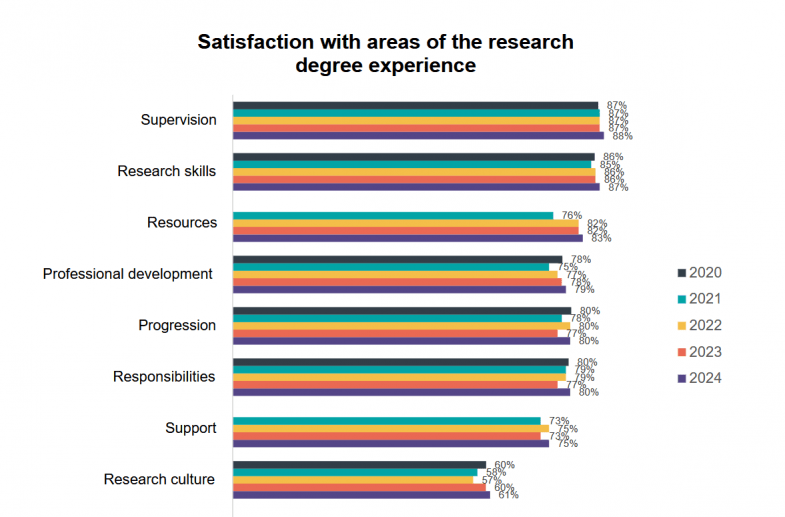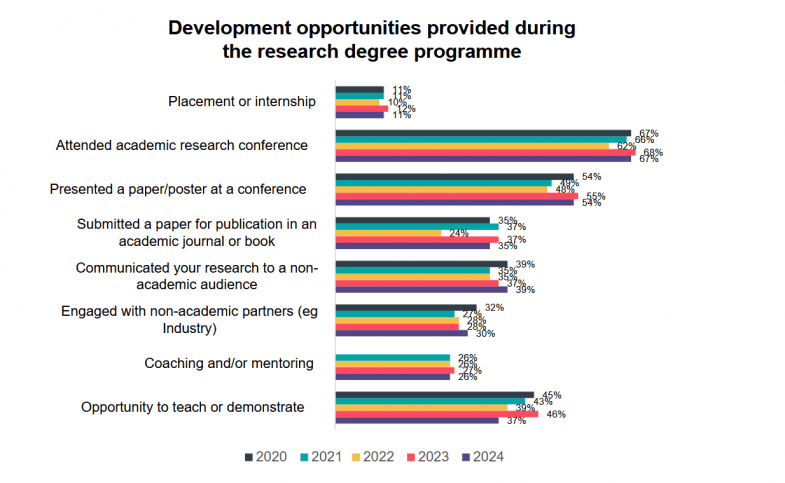Barely one in three postgraduate researchers (PGRs) are being given the opportunity to teach undergraduates, a major survey of UK and Australian PhD students has found.
While satisfaction rates are high among the 12,123 PGRs who responded to Advance HE’s 2024 Postgraduate Research Experience Survey – with 82 per cent happy overall with their experience, rising to 84 per cent for international students, and just 10 per cent dissatisfied – there are less positive results when it comes to teaching opportunities.

Only 37 per cent of PGRs say they have had the chance to teach or demonstrate, according to the survey, published on 5 December, which received responses from PGRs at 57 UK and four Australian universities.
That is the lowest result since the pandemic, with 46 per cent of respondents in the 2023 survey confirming they had the chance to teach, while the figures were 43 per cent and 39 per cent in in the 2021 and 2022 surveys respectively.
Fewer opportunities to teach undergraduates are likely to reflect how universities are facing “significant pressure financially,” reflects the Advance HE report, written by its business intelligence and surveys lead Jonathan Neves.
“While it may be relatively cost-effective to deploy PGRs to teach on modules rather than bring in temporary staff, we can also speculate that higher education institutions may be taking decisions to distribute teaching load more widely among salaried staff as an even more cost-effective solution,” he explains.
“Whatever is driving this, it appears that there are fewer PGRs being afforded this key developmental (and financial) opportunity than in recent years.”
The lack of teaching opportunities is reflected in comments from PGRs quoted in the study. One PGR explains how they were not “given any [teaching experience] despite being in the department for seven years”, while another spoke of their wish for “part-time teaching opportunities on campus so that I can promote my academic and social values, improve my communication skills, learn and engage with other students, put my studies/research into practice [and] then boost my future teaching career.”
Another complains that their “institution is extending teaching opportunities to external lecturers while neglecting the potential of our own highly qualified researchers”.
Campus resource collection: Is your academic career cleared for take-off?
The lack of teaching opportunities is particularly apparent among PGRs from an ethnic minority, with just 34 per cent of black, Asian or minority ethnic PGRs doing any teaching during their research degree compared with 41 per cent of white PGRs.
However, scores in most other development indicators have held steady or improved on recent years, with 54 per cent of respondents saying they had presented a paper or poster at a research conference, while 30 per cent had engaged with a non-academic partner, such as industry, during their research degree.

Register to continue
Why register?
- Registration is free and only takes a moment
- Once registered, you can read 3 articles a month
- Sign up for our newsletter
Subscribe
Or subscribe for unlimited access to:
- Unlimited access to news, views, insights & reviews
- Digital editions
- Digital access to THE’s university and college rankings analysis
Already registered or a current subscriber?








